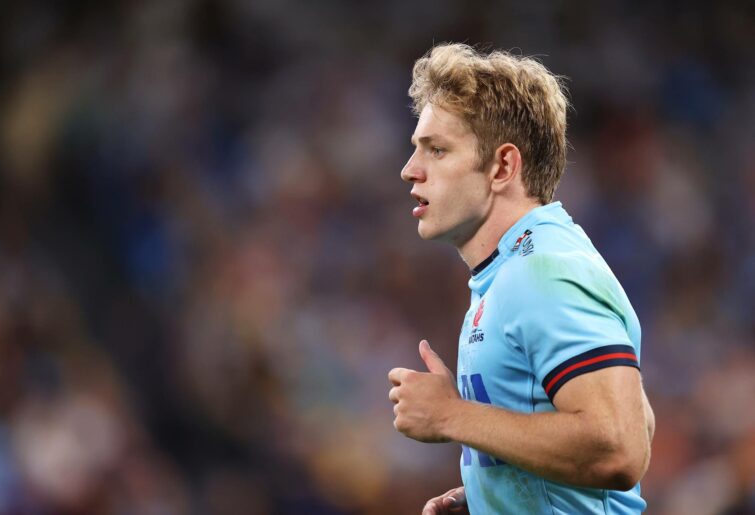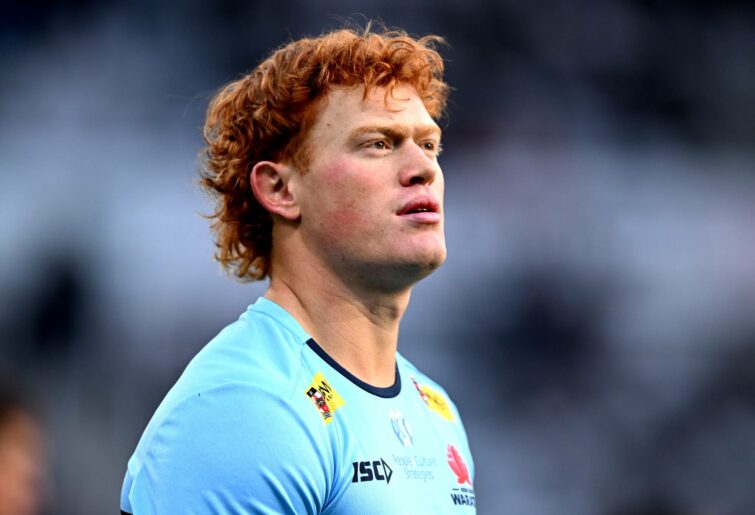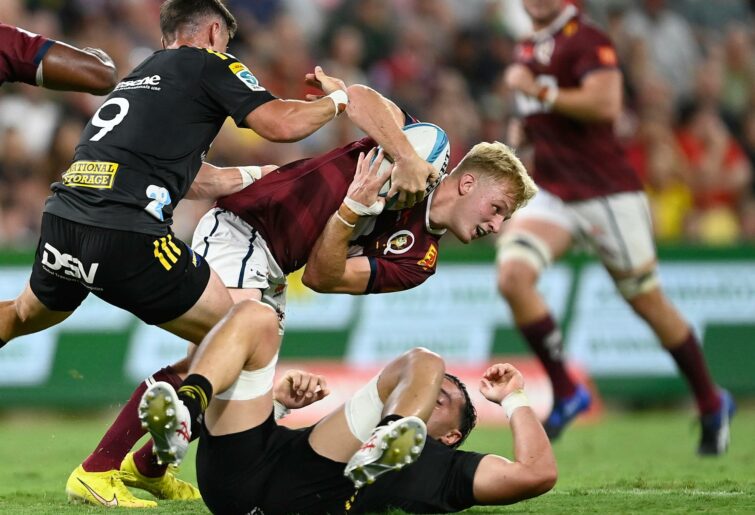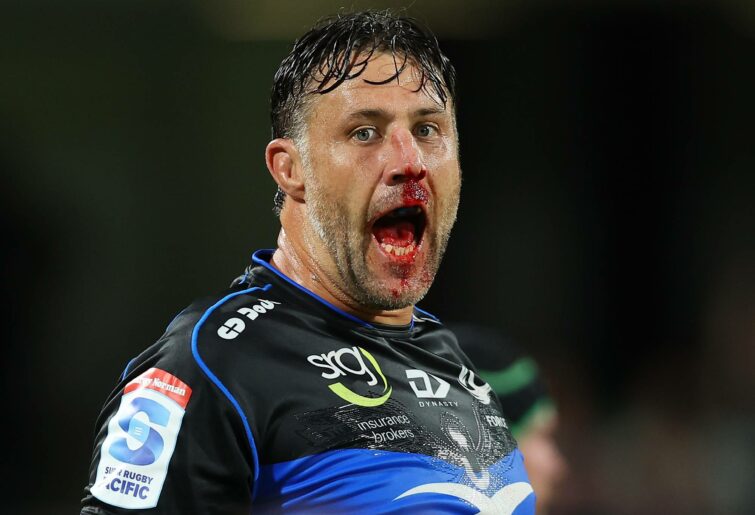Referee Damon Murphy hasn’t always endeared himself to rugby fans, but his decision to ping Rebels halfback Ryan Louwrens for taking too long to clear the ball from a ruck on Saturday night was met with widespread approval, and illustrated how keen referees are to do their bit to enhance rugby as a spectacle.
Ben O’Keeffe set the tone right from the opening whistle in Christchurch, hustling things along, with injured players like Anton Lienert-Brown offered little sympathy or leeway.
The sentiment remained in evidence at all matches, albeit Angus Gardner inexplicably allowed Reds prop Zane Nonggorr an age to change his boots during the first half in Townsville.
It’s been hard to find a negative word about the latest law changes and their application. In the old language, there is less dicking around, ball-in-play time is up and fatigue is once again a factor in rugby. And with fatigue comes opportunity.
But before we get too carried away heralding a new golden age of fast-paced, running rugby, it’s worth considering a couple of things.
Expert Roar analyst Nick Bishop wrote during the week about how increased tempo and fast recycling is not only a problem for defences, but poses a challenge for attacking lines to form and take shape. Sides no longer have the luxury of being able to set pre-determined three-man or two-man pods in midfield; there simply isn’t enough time or breath.
This feeds into more unstructured play; a win for those who detest static, white-board rugby, but a loss for those who, while they appreciate individual skill and sevens-style freewheeling, still don’t like to see things get overly scrappy.
Of the two opening night matches, the New Zealand derby saw only six scrums. In the match that followed in Sydney, there were 18. What is one man’s meat and potatoes is another man’s Kale, but I’d argue that six scrums were too few to provide the game with balance and shape, and 18 too many, particularly with a high proportion ending in penalties. The sweet spot lies somewhere in between.
There were early signs in Christchurch that something was askew, when in a pre-match interview, Scott Robertson failed to even once mention the All Blacks’ coaching job. Perhaps he knew, deep down, that the Chiefs had something cooking?
It all seemed routine at the beginning, with the Crusaders taking advantage of a piece of quality refereeing by O’Keeffe, who sent Sam Cane to the sin bin for cynical offside play, without prior warning.
Too often referees work through a predictable warning process; one that players have learned to game. Not this time; Cane was sent to the chair and David Havili took the honour of notching the season’s first try. Codie Taylor would have had the second but for a slip at the back of a maul, and 10-7 was to be as good as it got for the home team.
The Chiefs leveraged their staunch defensive line to grow into the game, before bossing the second half. Seemingly gone are the days when senior All Blacks would ease themselves gently back into Super Rugby in a World Cup year; both Cane and Brodie Retallick going the full distance and hardly skipping a beat.
Post-match discussion from Sydney centred around the emergence of two new wingers in the Waratahs’ Max Jorgensen and the Brumbies’ Corey Toole; both blessed with abundant pace and talent; both now burdened with the weight of expectation that is thrust upon all promising, young Australian players.
Unsympathetic TMO James Leckie did his best to spoil the party for Toole, harshly denying him a scintillating try-assist for Rob Valetini, but Toole was having none of it, following up with a score anyway, and matching it with the equally impressive Jorgensen.

SYDNEY, AUSTRALIA – FEBRUARY 24: Max Jorgensen of the Waratahs runs during the round one Super Rugby Pacific match between NSW Waratahs and ACT Brumbies at Allianz Stadium, on February 24, 2023, in Sydney, Australia. (Photo by Mark Kolbe/Getty Images)
What was lost in all of the excitement around the young Tahs winger was that it was he who wandered out of position, under the posts, leaving Andy Muirhead unattended on the wing, to score a bizarre try; where things seemed to freeze in time and Brumbies halfback Ryan Lonergan was the only person in the stadium who realised there was actually a match on.
Nevertheless, it’s better to get things like this out of the way early. It’s a mistake we shouldn’t expect Jorgensen to make again.
For the most part, the Brumbies looked well organised, building off strong running performances from Valetini, Nick Frost and Tom Wright. And what about the special effort from 37-year-old John Ulugia, who once played a handful of matches for the Brumbies in the early 2010s, and who I last sighted pumping out sets in the club gym at Clermont-Ferrand, in 2017?
For any player, let alone a member of the coaching staff, to be called into action at late notice, without his own gear, and put in a 75-minute shift of such quality, almost defies belief. Already a contender for individual performance of the year.
Finishing 31-25 down, the Waratahs lost a little skin, and Angus Bell, but not the hearts of their fans. There are issues though, around pack balance, and questions as to whether Michael Hooper and Charlie Gamble belong in the same loose forward trio.
Tane Edmed is a brave defender, but was isolated and exposed on defence; another feature of the nature and pace of the game potentially exposing flyhalves to more defensive tests without them having the same degree of back-up from their forwards they may have enjoyed in the past.

Tane Edmed (Photo by Getty Images)
Auckland’s fickle weather may have cost Elton John a Mt Smart Stadium appearance but it didn’t stop Moana Pasifika and the Fijian Drua delivering a thriller there; the win going to the Drua 36-34.
The Drua started disastrously; a muffed kick-off and scrum penalty helping to concede a try to within two minutes. More followed, with the Drua – as surprising as it sounds for a Fijian team – failing to stand up physically to the uncompromising, direct play of their opponent.
When they finally did muscle up, the match came alive; a trick ball from No.8 Te Ahiwaru Cirikidaveta setting up a try for Iosefi Masi just before half-time, and impressive hooker Tevita Ikanivere jetting 40 metres on the angle from first receiver, just after half-time.
It looked like Moana Pasifika’s start was still going to be enough to see them home, until replacement Taniela Rakuro, who only signed on as a fully contracted player on Wednesday, raced down the right-hand touchline, slipped over, but still managed to plant the ball for the winning try.
There was still a tense final scrum to negotiate, but survive it they did. Six tries to five to the Drua probably means the result was a fair one, but this was definitely one of those “rugby was the winner” days.
The Highlanders were another side who took too long to adjust to the rigours of Super Rugby, failing to respect possession and being brutalised on the counter by a hungry-looking Blues side.
To their credit, they stayed in the fight to limit the half-time damage to 31-20, but the shame for Highlanders fans was that there was a second 40 minutes; the final score blowing out to 60-20.
New Highlanders captain Billy Harmon, is a brave, combative player, who isn’t always in touch with reality. His previous claim to fame was calling a captain’s challenge for foul play by Dane Coles, only for the replay to out him as the man who started it; Harmon essentially volunteering himself for a yellow card.
Here, asked for his thoughts post-match, Harmon told TV viewers, “I felt like we played pretty awesome, our defence was top-notch.” One suspects that won’t be a view shared by coach Clarke Dermody, but if it is, the Highlanders are in for a long season.
For the most part, the dominant feature of the Reds versus Hurricanes was the Townsville sweat box. Numerous handling errors helped keep the match tight, with the teams going into the sheds separated by just three points.
After the break the Hurricanes limited their errors and started to play more directly, and while the Reds were unlucky not to score a couple of times, 31 unanswered points and a final score of 47-13, told the true story of where the dominance lay.

(Photo by Ian Hitchcock/Getty Images)
One match is not a sample size from which to be drawing any firm conclusions, but the obvious difference here in athleticism and speed does not bode well for the Australian franchises.
Perhaps New Zealand’s biggest weakness is post-match interviews, with Julian Savea challenging Harmon in the ‘what the heck is he banging on about?’ stakes, responding to a question about the hot, sweaty conditions with, “Yeah, coming from Wellington, the highest it gets is 10 or 16.”
I’m not sure what career options Savea has post-retirement, but I suspect that being a meteorologist isn’t one of them. Meanwhile, spare a thought for those poor Wellingtonians, doing it tough, never having known the joys of balmy 17-19 degree days.
The Rebels’ better organisation around the set piece and in the red zone, and Richard Hardwick dominating the breakdown, put them out to a handy 24-10 lead in Perth. But with the Force significantly dropping their error rate in the second-half, totally dominating territory and possession, and asking lots of tough questions, nobody could argue the 34-27 final result.
Getting on the scoresheet was another 37-year-old secret weapon, Jeremy Thrush, dragged out of retirement to plug the gap left by Izack Rodda’s foot injury.

Jeremy Thrush of the Force looks on during the round one Super Rugby Pacific match between Western Force and Melbourne Rebels at HBF Park, on February 25, 2023, in Perth, Australia. (Photo by Paul Kane/Getty Images)
Force fans can also thank Sam Cordingley, general manager of professional rugby at the Reds, who was responsible last year for blocking the transfer of centre Hamish Stewart to the Rebels.
Pushed westward, Stewart seems to be relishing his new environment, always a threat on the carry, and typically resolute in defence.
The saddest place in the rugby world right now is Wales, not just for their 20-10 loss to England confirming their path towards a Six Nations wooden spoon, but because 28 years of mismanagement since rugby became professional has finally come to a head, in the most painful and public way.
At least the threat of strike action was set aside by players who were obviously giving their all for their country and jersey, but at this level, desire alone is not enough. Welsh rugby needs many things right now, but perhaps the first thing coach Warren Gatland needs is to settle on loose forward and midfield combinations that he can build a competitive side around.
Not that this is to describe the match as one of England’s finest hours. Coach Steve Borthwick will just be grateful for the win, and for Freddie Steward’s prodigious ability.
While Italy’s improvement remained visible, Ireland’s march to the title continued, shaking free from 24-20 to close out the match 34-20.
Next weekend in Melbourne offers much promise, not just for the prospect of seeing all 12 sides in action at close quarters, but because rugby seems to have stumbled upon a solution for fans and participants frustrated by a game which had tied itself in knots around interminable TMO interventions, water breaks and pre-lineout huddles.
Super Rugby has hit the accelerator early. Yes, there’ll be potholes and blind corners along the way, but as far as season starts go, this was a mighty fine one.
































































































